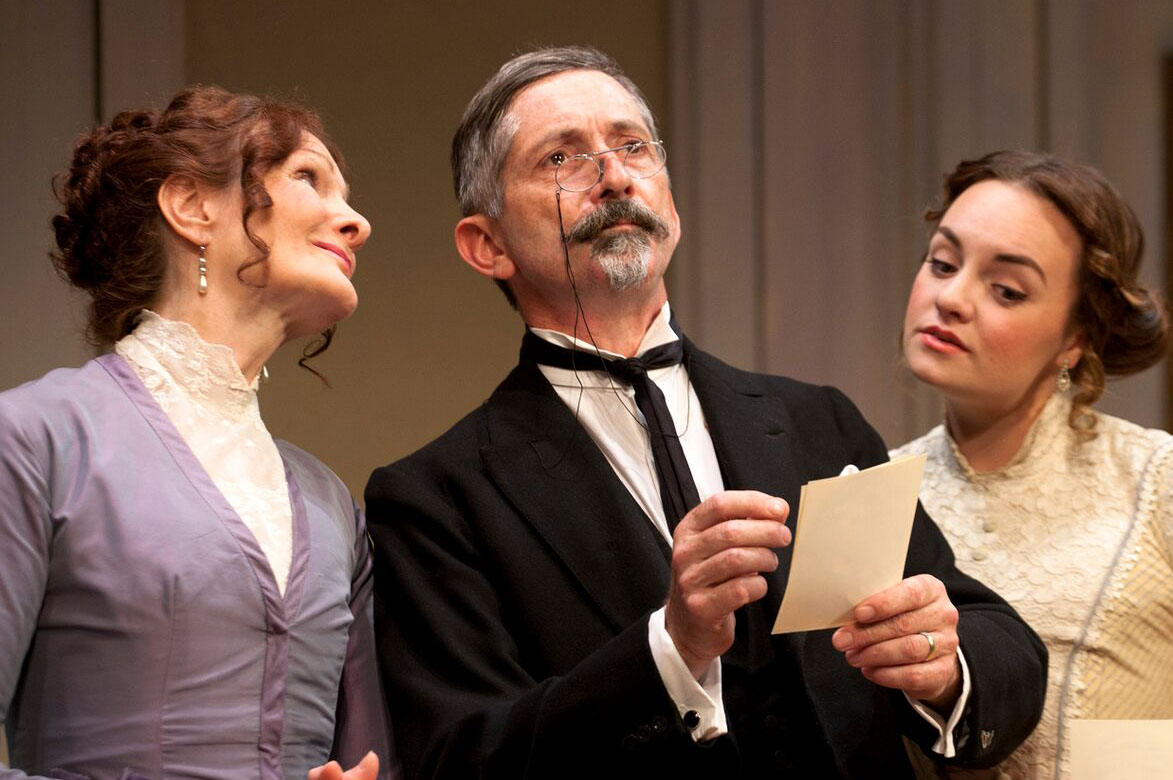Farce is as old as Western comedy itself and perhaps finds its full flowering in the French theatre around the turn of the nineteenth century, when many of the usual devices such as extravagant plot are kept whilst stock characterization gives way to more nuanced treatment. Monsieur Popular is by one of the masters of the genre, Eugène Marin Labiche.
Here we find love, not thwarted by an irascible parent, at least not directly, but potentially by the rakish past of the protagonist, Celimare (Raymond Coulthard) whose previous philandering with a series of married women comes back to haunt him on the eve of his marriage to the beautiful – and much younger Emma (Charlotte Wakefield). His ‘problem’ is that he has made a virtue out of befriending the improbably, but happily credulous husbands he has cuckolded by carrying on affairs with their wives right under their noses and who now regard him as their ‘best friend’. The action of the play starts on Celimare’s wedding day and revolves around his attempt to get rid of these buffoons before they and his new wife discover the truth about his prior lechery, the evidence of which is contained in bundles of love letters contained in a wooden casket.
Constantly tripped up in his explanations of potentially damning facts Celimare has to resort to much quick thinking. This, as ever, is the source of much amusement, but (early in the run) was at times undertaken at too leisurely a pace and had the effect of releasing some of the tension of the situation, the character seemingly in control of rather than at the mercy of events. Again, large parts of the text are delivered directly to the audience in barely disguised asides, which again, whilst bringing the audience in as confidants to the scheming, seemed a trifle overdone and stood in danger of disengaging the audience from the action. However this can only ever be momentary in a script (translated by Jeremy Sams who also directs) which never flags, is full of double entendres of often the most salacious kind and such delicious ironies.
Otherwise Sams clearly has a grip on the genre and delivers in the comings and goings, the broad physical comedy, the character foibles and nonsensical plot, whipping the whole into a delectable froth, which only requires one to sit back and enjoy it for what it is. In Mr Coulthard he has a natural in light comedy who breezes through the play as the embodiment of (male) fun in the Belle Époque. His character is engagingly louche and, by the norms of the day, morally lax – which of course was part of the appeal.
The rest of the cast all deliver on the requisite style as does the restrained opulence of Polly Sulivan’s bright and adaptable set. Mr. Sams has also penned a few clever songs which add to the jollity of proceedings.
There seems to be no end to our delight in stock characters floundering in impossible situations. Shakespeare and Moliere both understood the attraction and use of farce in their comedies and the genre has been kept alive in recent times by the likes of Ayckbourn, Frayn and Stoppard. Many treasures of French farce await to be rediscovered (I would commend Let’s Get a Divorce by Sardou and de Najac which has one of the best woman’s parts you are likely to find) and I’d put money on Laurence Boswell being the man to sniff them out. Monsieur Popular is a delightfully tasty blancmange of a play, full of unpretentious fun and I would not be surprised to find it coming back to the main house in the not too distant future. ★★★★☆ Graham Wyles 10th 0ctober 2015
Photo by Simon Annand


